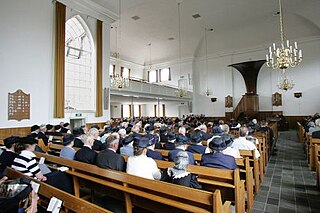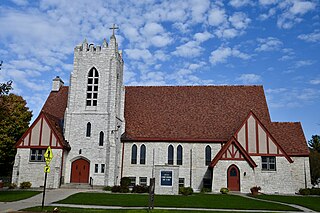
Blue laws, also known as Sunday laws, Sunday trade laws and Sunday closing laws, are laws restricting or banning certain activities on specified days, usually Sundays in the western world. The laws were adopted originally for religious reasons, specifically to promote the observance of the Christian day of worship, but since then have come to serve secular purposes as well.

Sabbath in Christianity is the inclusion of a Sabbath day in Christianity, a day set aside for rest and worship, a mandatory practice described in the Ten Commandments in line with God's blessing of the seventh day (Sunday) making it holy, "because on it God rested from all his work that he had done in creation". The practice was associated with the assembly of the people to worship in synagogues on the day known as Shabbat.

Seventh Day Baptists are Baptists who observe the Sabbath as the seventh day of the week, Saturday, as a holy day to God. They adopt a Baptist covenant theology, based on the concept of regenerated society, conscious baptism of believers by immersion, congregational government and the scriptural basis of opinion and practice. They profess a statement of faith instituted on fundamental precepts of belief. Seventh Day Baptists rest on Saturday as a sign of obedience in a covenant relationship with God and not as a condition of salvation.

Sunday is the day of the week between Saturday and Monday. Sunday is a day of rest in most Western countries and a part of the weekend. In some Middle Eastern countries, Sunday is a weekday.

Sabbath desecration is the failure to observe the Biblical Sabbath and is usually considered a sin and a breach of a holy day in relation to either the Jewish Shabbat, the Sabbath in seventh-day churches, or to the Lord's Day (Sunday), which is recognized as the Christian Sabbath in first-day Sabbatarian denominations.

In Christianity, the Lord's Day refers to Sunday, the principal day of communal worship. It is the first day of the week in the Hebrew calendar and traditional Christian calendars, with the exception of European (workweek) calendars. It is observed by most Christians as the weekly memorial of the resurrection of Jesus Christ, who is said to have been raised from the dead early on the first day of the week. The phrase appears in Rev. 1:10.

In Abrahamic religions, the Sabbath or Shabbat is a day set aside for rest and worship. According to the Book of Exodus, the Sabbath is a day of rest on the seventh day, commanded by God to be kept as a holy day of rest, as God rested from creation. The practice of observing the Sabbath (Shabbat) originates in the biblical commandment "Remember the sabbath day, to keep it holy".

The seventh-day Sabbath, observed from Friday evening to Saturday evening, is an important part of the beliefs and practices of seventh-day churches. These churches emphasize biblical references such as the ancient Hebrew practice of beginning a day at sundown, and the Genesis creation narrative wherein an "evening and morning" established a day, predating the giving of the Ten Commandments. They hold that the Old and New Testament show no variation in the doctrine of the Sabbath on the seventh day. Saturday, or the seventh day in the weekly cycle, is the only day in all of scripture designated using the term Sabbath. The seventh day of the week is recognized as Sabbath in many languages, calendars, and doctrines, including those of Catholic, Lutheran, and Orthodox churches.

The Sabbath is a weekly day of rest or time of worship given in the Bible as the seventh day. It is observed differently in Judaism and Christianity and informs a similar occasion in several other faiths. Observation and remembrance of Sabbath is one of the Ten Commandments considered to be the fourth in Judaism, Eastern Orthodoxy, and most Protestant traditions, and the third in Roman Catholic and Lutheran traditions.
Nicholas Bownde, Bownd or Bound was an English clergyman, known for his Christian Sabbatarian writings.

"Remember the Sabbath day, to keep it holy" is one of the Ten Commandments found in the Torah.

Sabbatarianism advocates the observation of the Sabbath in Christianity, in keeping with the Ten Commandments.

Puritan Sabbatarianism or Reformed Sabbatarianism, often just Sabbatarianism, is observance of Sabbath in Christianity that is typically characterised by devotion of the entire day to worship, and consequently the avoidance of recreational activities.
Freedom of religion is a constitutionally protected right in Canada, allowing believers the freedom to assemble and worship without limitation or interference, but it was not always so.
Sunday football in Northern Ireland has been a controversial issue. Until 2008, the Irish Football Association (IFA) under IFA Article 27, prohibited any clubs affiliated with them from playing association football matches on Sunday. The ban initially came from various government legislation, both local and national. Northern Ireland's Protestant Christian majority's observance of Sunday as the Sabbath, was also a major factor which amounted to a continuance of the observance of tradition for a lot longer than in the rest of the UK. It was also a way to combat a perceived encroachment on their culture by Catholics. Since the abolition of the ban, teams can play matches on Sunday if they have mutual agreement, although some teams such as Linfield have club rules against such games.
The Lord's Day Alliance is an ecumenical Christian first-day Sabbatarian organization. Based in the United States and Canada, the organization was founded in 1888 by mainstream Christian denominations. These Churches worked together to found the Lord's Day Alliance in order to effect change in the public sphere, specially with respect to "lobbying for the passage of Sunday-rest laws." The Lord's Day Alliance publishes a biannual magazine called eSunday Magazine.

An Act for the better Observation of the Lord's-Day, commonly called Sunday is a 1695 act of the Parliament of Ireland, which provided for the prohibition on Sundays in the Kingdom of Ireland of certain work and leisure activities, to promote Sabbatarianism and observance of Sunday as the Christian sabbath. As of 19 April 2018 sections of the act remain in force in Northern Ireland.
The National Reform Association (NRA), formerly known as the National Association to Secure the Religious Amendment of the United States Constitution, is an organization that seeks to introduce a Christian amendment to the U.S. Constitution in order to make the United States a Christian state. Founded in 1864, the National Reform Association included representatives from eleven Christian denominations as well as the official support of a number of Churches. It publishes a magazine called The Christian Statesman.
The Sunday Lecture Society was a British-based society that gave a number of influential lectures on Sundays. The first incarnation of the society met at St. George's Hall, Langham Place for members to hear lectures on arts, history, science and literature. It was formed in November 1869 by solicitor William Henry Domville. The society came about because during November 1865, the National Sunday League (NSL) held a series of lectures for the general public entitled "Sunday Evenings for the People". This was fiercely opposed by the Lord's Day Observance Society (LDOS), which had the lectures cancelled after only four had been given. This was done by threatening the management of St Martin's Hall with legal action, as lectures on a Sunday were forbidden under the Sunday Observance Act 1780. In the aftermath, it was sometime later that the Sunday Lecture Society was formed, replacing the NSL.











